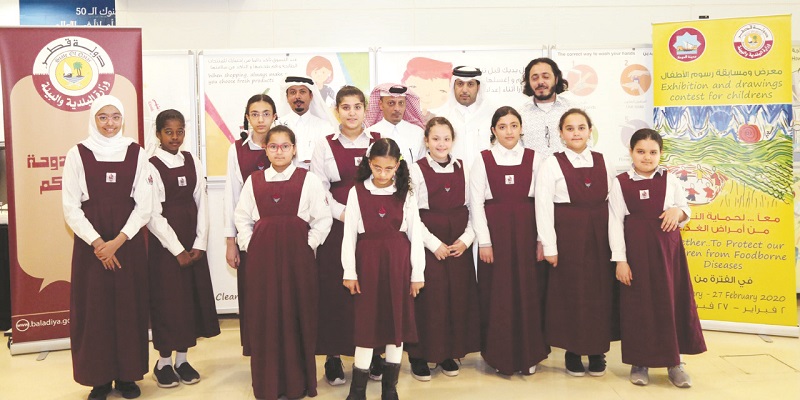
The risk of food-borne illnesses can be reduced by educating children about proper kitchen etiquette, causes of various food-borne illnesses and their consequences, and maintaining hygiene.
The Ministry of Municipality and Environment organised a two-week event to educate school students about food-borne diseases with the help of drawing contests and exhibition showcasing healthy foods and their benefits, proper ways of storage and handling foods.
A total of 1,283 students (boys and girls) from 48 schools – 31 government and Arabic schools, 17 international schools and two centres for students with disabilities participated in the Exhibition and Drawings Contest for Children held at the headquarters of Doha Municipality last month.
Held under the theme ‘Together to Protect Our Children from Food-borne Diseases’, the event was held from February 2 to 13 and comes within the framework of the efforts of the Ministry of Municipality and Environment to keep consumes healthy and safe.

The annual exhibition is part of the efforts exerted by the Doha Municipality (Health Control Section) in disseminating awareness through art and developing a method for communicating information among school students and draw the attention of children towards food safety and healthy nutrition.
The children drew paintings to check their abilities to absorb the information that they had gained through the explanation. Best drawings were given prizes to recognise their efforts.
The booklets carrying the children’s distinguished drawings from the previous year contest were distributed to all children participating during the exhibition.
The event was part of the efforts of Doha Municipality represented by the Municipality Control Department to spread the food safety and environmental awareness and develop artistic expression and creativity among school children as health awareness is considered one of the most important means to achieve food safety.
The annual exhibition aimed to introduce children to healthy food and scientific aspects to preserve the safety and handling food and to avoid food-borne diseases, as art of drawing represents a global language and a common understanding among the peoples of the world.
The exhibition included 40 drawings in the field of food safety and healthy nutrition through the handling, processing and storage of food and good food habits.

The paintings contained simple expressive drawings and an awareness phrases in both Arabic and English that gave tips on food safety, and instructions on the preparation and processing of foods as well as sterilisation of tools to ensure food safety, sources of infection, food contamination and proper nutrition.
At the headquarters of Doha Municipality, the exhibition received students from six schools every day from 9am until 12noon, where they had drawn paintings on activities that were part of the theme of the exhibition.
The Exhibition and Drawings Contest for Children was held last year under a theme ‘Together for a Clean City”. The officials at Doha Municipality also introduced schoolchildren to municipal services through simple and interesting information, as well as the basic principles of hygiene and environmental health rules.
The event also enhanced the role of community partnership in serving municipal issues, especially hygiene and the environment and its implications for public health and nutritional habits and proper ways to dispose of household and solid waste and reduce environmental pollution, for a modern and livable city.
Exhibition and Drawings Contest for Children comes within the many efforts exerted by the competent authorities of the Doha Municipality in the field of public cleanliness and food safety, as a contribution to achieving the goals of the Qatar National Vision 2030 and the sustainable strategy of the Ministry of Municipal and Environment 2018 – 2022 to keep pace with the fast development taking place in Doha and other Qatari cities.
The move aims at raising a generation that is aware of the importance of preserving the cleanliness and safety of its environment in which they live. The hygiene has become one of the global environmental standards for the progress and civilisation of people, so that high-level cleaning services can be achieved in all cities and regions of the country, which requires the cooperation of community members with the ministry by promoting positive culture and behaviors and avoiding wrong practices.

According to the experts, food-borne illness is caused by consuming contaminated foods or beverages. Many different disease-causing microbes or pathogens can contaminate foods, so there are many different types of food-borne illnesses.
Most food-borne diseases are infections caused by a variety of bacteria, viruses, and parasites. Other diseases are poisonings caused by harmful toxins or chemicals that have contaminated food.
According to World Health Organisation (WHO), food-borne diseases encompass a wide spectrum of illnesses and are a growing public health problem worldwide. They are the result of ingestion of foodstuffs contaminated with microorganisms or chemicals. The contamination of food may occur at any stage in the process from food production to consumption (farm to fork) and can result from environmental contamination, including pollution of water, soil or air.
The most common clinical presentation of food-borne disease takes the form of gastrointestinal symptoms; however, such diseases can also have neurological, gynaecological, immunological and other symptoms. Multi-organ failure and even cancer may result from the ingestion of contaminated foodstuffs, thus representing a considerable burden of disability as well as mortality.




